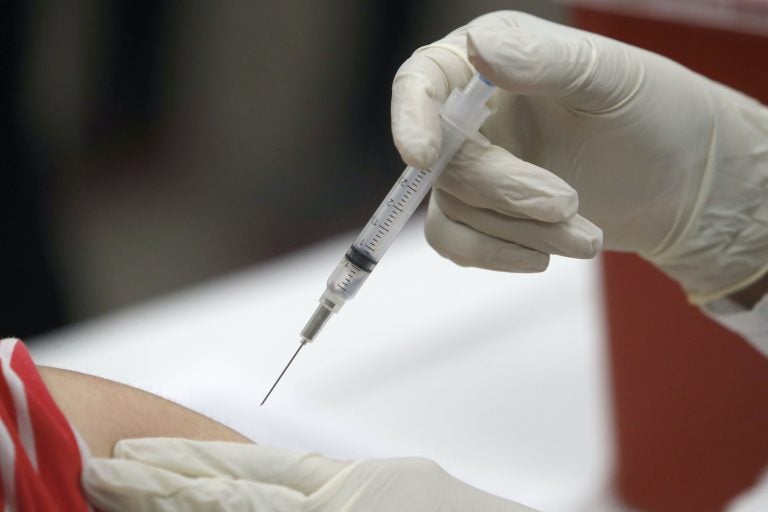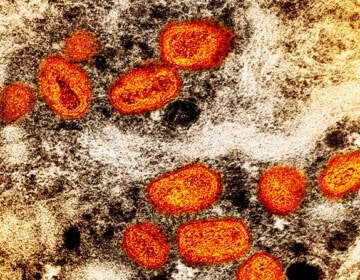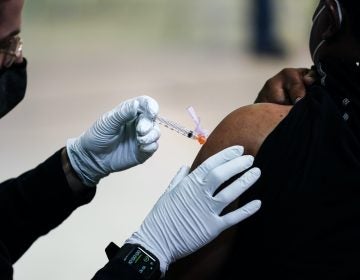‘New normal’ for non-COVID health care
As the Philly restrictions, doctors are starting to reschedule routine visits. Here's why many of the changes they've made in response to the COVID-19 pandemic will stick.
Listen 17:30
A syringe with an influenza vaccine inside heads to its mark during a flu vaccination at Eastfield College in Mesquite, Texas, Thursday, Jan. 23, 2020. (LM Otero/AP Photo)
As the Philly region starts to relax coronavirus restrictions, doctors are starting to reschedule routine appointments, like flu shots and dental cleanings, as well as elective surgeries. Still, some patients wonder … is it safe?
WHYY health reporter Alan Yu explains how doctors have already been working to mitigate risk and treat patients during the pandemic, and how this “new normal” gives us a glimpse at the future of health care — even after COVID-19 is under control.

Hear the whole story on The Why
Interview highlights
On how hospitals changed protocols for the pandemic
The policy was to free up as much space as they could so they could prepare for a potential surge of COVID patients. And so the Pennsylvania Department of Health … like many other departments across the country, asked hospitals and doctors’ offices to put what they call elective procedures and appointments on hold. The hospital also looked into ways that they could treat patients without bringing them into the building. For example, there was a lot more of a move towards telemedicine, getting in touch with patients, either through phone calls or video calls, and bringing patients in in person if it was absolutely necessary…
Penn Medicine and Jefferson Health, they had been, pre-pandemic, trying out offering infusions of some cancer drugs at home. And so what they did when the pandemic started was just expand those programs so that if patients did not want to come in to their outpatient clinics, also their labs for infusions, then they could get those at home… The medical staff would send over the medicine and the necessary equipment for the infusion and then a nurse would come to her home or to her workplace to deliver the infusion.
Obviously, that sounds very prescient now because that could still happen during the pandemic. [The patient] did say that it was nice to be able to do this so that she could follow social distancing guidelines and avoid leaving her house unless it was necessary.
On whether doctors recommend patients come back in for routine care
At this point, yes, they absolutely do … Neil Fishman, an infectious disease specialist and the Chief Medical Officer for the Hospital at the University of Pennsylvania, said that seeing fewer patients coming in for routine problems worries him, because if you think about it, these problems still exist. And so he said it is critical for people to still come in for their annual physical exams, for gynecological checkups, for mammograms, colonoscopies because you want to prevent as many of these preventable health problems as possible.
Another thing that Neil Fishman said is especially important are vaccinations. And so he said it would be much worse if people were not getting routine vaccinations because they were afraid of going to a hospital or a doctor’s office, and then later on, we have a spread of a disease that could be prevented by vaccines like measles. And we see some evidence that that that is already happening. A CDC report from Michigan reported a drastic drop in the number of children aged two or younger who were up-to-date with their vaccinations, and it said that this makes outbreaks of diseases like measles possible.
On doctors’ response to patients’ fears of getting COVID-19 at their offices
One thing that some other doctors sometimes say is that it is safer to go to a doctor’s office than your average grocery store because there will be much more precautions against the spread of COVID-19 in a health care setting.
WHYY is your source for fact-based, in-depth journalism and information. As a nonprofit organization, we rely on financial support from readers like you. Please give today.






